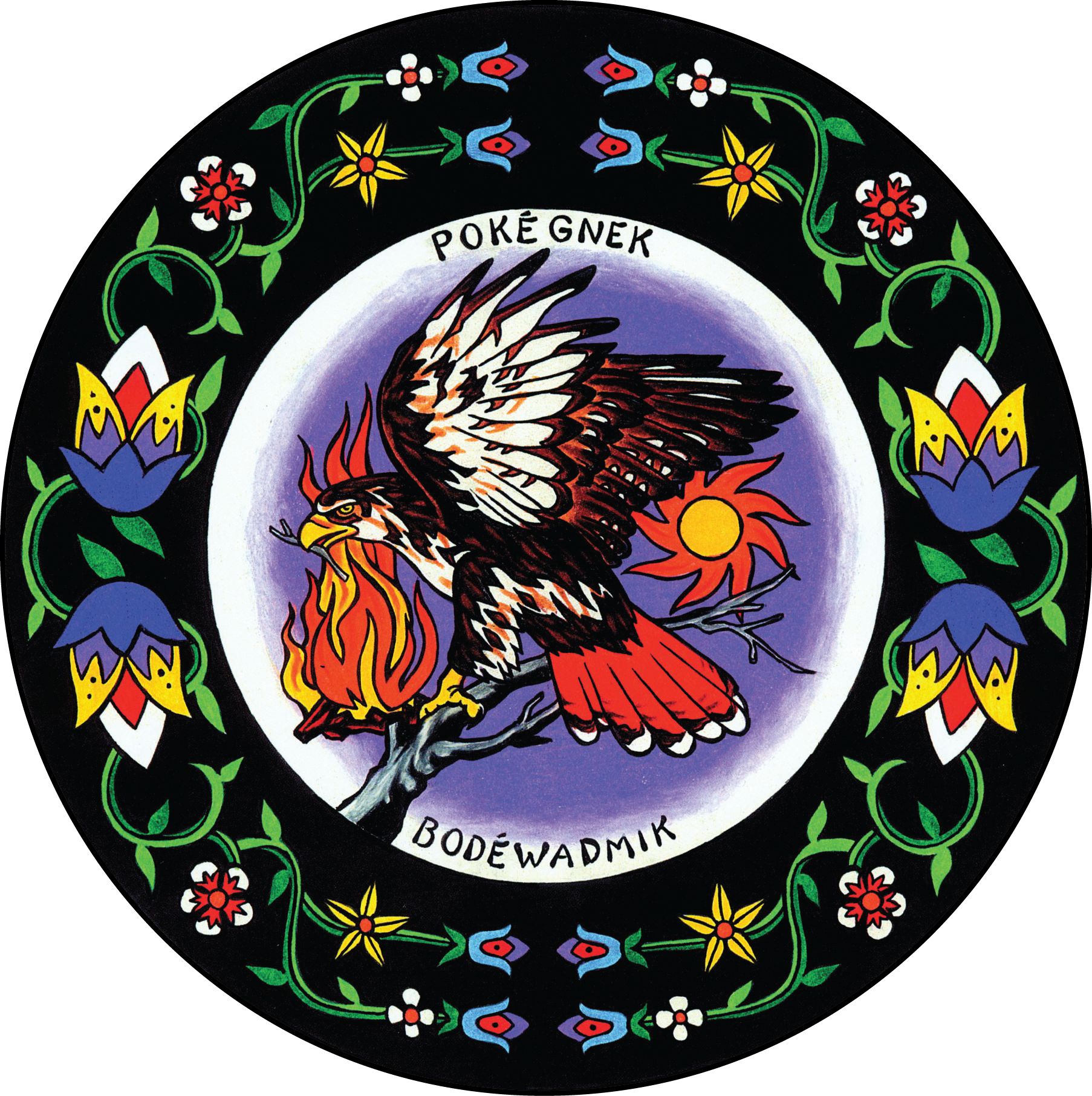Audio Recording: Reading of Pottawatamie Book of Genesis by Simon Pokagon (1901)


Summary:
Narrated by Majel DeMarshDescription:
This recording was made possible by funding from the Less Commonly Taught and Indigenous Languages Partnership, funded by the Andrew W. Mellon Foundation, housed in the Center for Language Teaching Advancement (CeLTA) at Michigan State University. Recordings were done in the summer of 2022. PI for this grant project was Blaire Morseau. Translations and updated spellings for Potawatomi words were provided by Kyle Malott.
People:
Simon PokagonTranscription:
Neshnabé ėgi gzhémayét dbathmowen
(Pottawattamie Legend
of the Creation of Man.)
By
Chief Pokagon
Narrated by Majel Winchester DeMarsh
There is an old tradition among our people dimly seen through the mists of time, that Ktthė mnedo (The Great Spirit), after he had created namés (the fish) of mbinak (the waters), and bnéshik (the fowls) of noden (the air), and mnedowêk (the beasts) of kė (the land) His work still failed to satisfy the grand conception of His soul. Hence He called a great Council of Mnedok (the spirits) that ruled over land and seas, His agents, and revealed unto them how it was the great desire of Wdé’ (His heart) to create a new being that should stand erect upon his hind legs, and to possess the combined intelligence of all the living creatures He had made.
Most of those spirits whom He had permitted to hold dominion over the earth, when they met in the grand Council, encouraged His Divine plans, but Mnedo wgemak (the spiritual Chiefs) when they considered the great power the proposed being might wield, quietly withdrew themselves from the Council, and held a private pow wow of their own, to frustrate, if possible, the plans of How-waw-tuck (the Almighty.) The loyal Mnedok who remained at the grand Council stood aghast as Ktthė mnedo revealed unto them His Divine plan, explaining the great possibilities that awaited the new creature He had conceived in His heart to create.
The Divine Council was prolonged by debate from the set of sun until morning dawn. Gizes (the sun) arose in greater brilliancy than ever before. The Spirits anxiously began to inquire of His Majesty, “How many suns and moons would pass before He could accomplish His wonderful work?” While yet the inquiry hung on Wdonwan (their lips), He said unto them: “Follow me.” He led them into a great
wilderness to Zagen, a beautiful inland lake. And as He stood upon the shores thereof in the presence of them all, His eyes flashed wawasmowen (lightning)! The lake became boiling water! The earth trembled! He then spake in a voice of thunder: “COME FORTH YE LORDS OF KĖ (the world)!” The ground opened! And from out of the red clay that lined the lake came forth Nėnė minė kwé (man and woman) like gigo (flying fish) from out the water! In presence of the new born pair, all was still as death! A dark cloud hung over the lake! It began to boil again. The awful silence was then broken! The earth shook! And Ktthė mnedo said: “Come forth ye servants of Neshnabé (man)!” Forth leaped at once from out the lake nish wabnëmêk (a pair of snow-white dogs) and laid down where stood the new made pair kissing their feet and hands.
The bride and groom then each other fondly kissed as hand in hand they stood, in naked innocence, in the full bloom of youth, perfect in make and mould, of body and of limb. Gnëmkedéwankwéwêk (their long black hair) almost reached the ground, which, gently waving in nib noden (the morning breeze) in contrast with their rich color, grace, and forms erect, outrivaled in beauty all other creatures He had made. They looked all about them in wonder and surprise. Surveyed all living creatures that moved in sight. Gazed upon the towering trees. The grass. The flowers. The lake. The sun shine and the shade. And again at each other fondly kissed, as their eyes looked love to eyes, with no other language their feelings to express.
At length kwé (the maiden fair) slily let go Shkenwé wnetth (the young man’s hand) and stole away into the dark shades and hid, where she might watch to test his love, and learn thereby if his feelings were akin to her’s. Long he sought in vain to find his mate, until at length the snow-white dogs, following on her track, joyfully howled out: “We have found her.”
Now when Mnedo wgemak (the spiritual Chiefs) first learned that Ktthė mnedo had finished His crowning works, as He had proposed to do, sought diligently for the new made pair until they found them. And as they surveyed the beauty of their forms erect, and the surpassing loveliness of body and
limb, their wonder and admiration was unbounded. But when they saw the soul of the Divine shining in their faces, like the noon-day sun, their hearts were stung through and through by Mthe’amok (the cruel wasps) of envy and jealousy. Hence they resolved, in wdé’wanen (their hearts), that instead of trying to live in peace with them, as they had done with the first creation, they would do all they could to make them discontented, unhappy and miserable.
As time rolled on, our first wgetsimen (parents) and generations after them, began to realize there were Mthemnedok minė Mnomnedok (bad spirits and good spirits) that exercised dominion over mountains, lakes, streams and plains, and that they were in a measure controlled by them. They also began to learn that Neshnabé (man) possessed the nature and the intelligence of all the animal creation; and that he was endowed with a spiritual nature which was given him by Thak gégo ga gishtot (the Creator of all things) in Wawkwik minė kik (in heaven and on earth). Hence when they were unfortunate in securing game, or unsuccessful in battle, it was all attributed to the bad spirits that held dominion over the country wherein they dwelt.
And when game was plenty, and they were successful in battle, this they attributed to the good spirits that controlled the land in which they lived. Sometimes in order to appease bad spirits, they made offerings of fruits and grains. But they sacrificed animals only to Ktthė mnedo [the God of Heaven] who alone they recognized as the great Creator and Ruler of all things in heaven and on earth.
Our fathers and mothers in their primeval state, did not name their children as do the civilized races, simply that they might be known and designated by them. But when their children were born, whatever animal or bird they imagined they most resembled they were called by that name; and as strange as it may appear to the whole white race, in after generations those bearing the name of some animal believed, at least they claimed, to have descended from such animal whose name they bore. It might mko [the bear], or wagosh [the fox], or mgezhwash [the eagle]. The same rule followed in each
individual case. And so it was in succeeding generations, each tribe or clan adopted as their “to-tum” the animal or thing whose name the patriarch of the tribe was called when a child.
Sometimes when at war, the animal was taken with them alive, but generally it was painted on a tanned hide and used as white men use their flags.
It was an emblem of royalty as well as a symbol of loyalty, and when engaged in battle a warrior would rather die than surrender his totum.
It matters not how foolish our legends may appear to those races who call themselves civilized, still they were as sacred to us as holy writ to them.
(Pottawattamie Legend
of the Creation of Man.)
By
Chief Pokagon
Narrated by Majel Winchester DeMarsh
There is an old tradition among our people dimly seen through the mists of time, that Ktthė mnedo (The Great Spirit), after he had created namés (the fish) of mbinak (the waters), and bnéshik (the fowls) of noden (the air), and mnedowêk (the beasts) of kė (the land) His work still failed to satisfy the grand conception of His soul. Hence He called a great Council of Mnedok (the spirits) that ruled over land and seas, His agents, and revealed unto them how it was the great desire of Wdé’ (His heart) to create a new being that should stand erect upon his hind legs, and to possess the combined intelligence of all the living creatures He had made.
Most of those spirits whom He had permitted to hold dominion over the earth, when they met in the grand Council, encouraged His Divine plans, but Mnedo wgemak (the spiritual Chiefs) when they considered the great power the proposed being might wield, quietly withdrew themselves from the Council, and held a private pow wow of their own, to frustrate, if possible, the plans of How-waw-tuck (the Almighty.) The loyal Mnedok who remained at the grand Council stood aghast as Ktthė mnedo revealed unto them His Divine plan, explaining the great possibilities that awaited the new creature He had conceived in His heart to create.
The Divine Council was prolonged by debate from the set of sun until morning dawn. Gizes (the sun) arose in greater brilliancy than ever before. The Spirits anxiously began to inquire of His Majesty, “How many suns and moons would pass before He could accomplish His wonderful work?” While yet the inquiry hung on Wdonwan (their lips), He said unto them: “Follow me.” He led them into a great
wilderness to Zagen, a beautiful inland lake. And as He stood upon the shores thereof in the presence of them all, His eyes flashed wawasmowen (lightning)! The lake became boiling water! The earth trembled! He then spake in a voice of thunder: “COME FORTH YE LORDS OF KĖ (the world)!” The ground opened! And from out of the red clay that lined the lake came forth Nėnė minė kwé (man and woman) like gigo (flying fish) from out the water! In presence of the new born pair, all was still as death! A dark cloud hung over the lake! It began to boil again. The awful silence was then broken! The earth shook! And Ktthė mnedo said: “Come forth ye servants of Neshnabé (man)!” Forth leaped at once from out the lake nish wabnëmêk (a pair of snow-white dogs) and laid down where stood the new made pair kissing their feet and hands.
The bride and groom then each other fondly kissed as hand in hand they stood, in naked innocence, in the full bloom of youth, perfect in make and mould, of body and of limb. Gnëmkedéwankwéwêk (their long black hair) almost reached the ground, which, gently waving in nib noden (the morning breeze) in contrast with their rich color, grace, and forms erect, outrivaled in beauty all other creatures He had made. They looked all about them in wonder and surprise. Surveyed all living creatures that moved in sight. Gazed upon the towering trees. The grass. The flowers. The lake. The sun shine and the shade. And again at each other fondly kissed, as their eyes looked love to eyes, with no other language their feelings to express.
At length kwé (the maiden fair) slily let go Shkenwé wnetth (the young man’s hand) and stole away into the dark shades and hid, where she might watch to test his love, and learn thereby if his feelings were akin to her’s. Long he sought in vain to find his mate, until at length the snow-white dogs, following on her track, joyfully howled out: “We have found her.”
Now when Mnedo wgemak (the spiritual Chiefs) first learned that Ktthė mnedo had finished His crowning works, as He had proposed to do, sought diligently for the new made pair until they found them. And as they surveyed the beauty of their forms erect, and the surpassing loveliness of body and
limb, their wonder and admiration was unbounded. But when they saw the soul of the Divine shining in their faces, like the noon-day sun, their hearts were stung through and through by Mthe’amok (the cruel wasps) of envy and jealousy. Hence they resolved, in wdé’wanen (their hearts), that instead of trying to live in peace with them, as they had done with the first creation, they would do all they could to make them discontented, unhappy and miserable.
As time rolled on, our first wgetsimen (parents) and generations after them, began to realize there were Mthemnedok minė Mnomnedok (bad spirits and good spirits) that exercised dominion over mountains, lakes, streams and plains, and that they were in a measure controlled by them. They also began to learn that Neshnabé (man) possessed the nature and the intelligence of all the animal creation; and that he was endowed with a spiritual nature which was given him by Thak gégo ga gishtot (the Creator of all things) in Wawkwik minė kik (in heaven and on earth). Hence when they were unfortunate in securing game, or unsuccessful in battle, it was all attributed to the bad spirits that held dominion over the country wherein they dwelt.
And when game was plenty, and they were successful in battle, this they attributed to the good spirits that controlled the land in which they lived. Sometimes in order to appease bad spirits, they made offerings of fruits and grains. But they sacrificed animals only to Ktthė mnedo [the God of Heaven] who alone they recognized as the great Creator and Ruler of all things in heaven and on earth.
Our fathers and mothers in their primeval state, did not name their children as do the civilized races, simply that they might be known and designated by them. But when their children were born, whatever animal or bird they imagined they most resembled they were called by that name; and as strange as it may appear to the whole white race, in after generations those bearing the name of some animal believed, at least they claimed, to have descended from such animal whose name they bore. It might mko [the bear], or wagosh [the fox], or mgezhwash [the eagle]. The same rule followed in each
individual case. And so it was in succeeding generations, each tribe or clan adopted as their “to-tum” the animal or thing whose name the patriarch of the tribe was called when a child.
Sometimes when at war, the animal was taken with them alive, but generally it was painted on a tanned hide and used as white men use their flags.
It was an emblem of royalty as well as a symbol of loyalty, and when engaged in battle a warrior would rather die than surrender his totum.
It matters not how foolish our legends may appear to those races who call themselves civilized, still they were as sacred to us as holy writ to them.
Related Dictionary Words:
Audio Player
Community:
Category:
Collections:
Original Date:
1901Original Date Description:
The birch bark book was published in 1901. The recording was created in 2022 and edited in 2023.Type:
Format:
